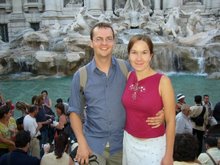Nehemiah 2:1-10 Responding to God's Call
How do you respond to a crisis? When you are faced by a big challenge what do you do? Now place yourself in the shoes of Nehemiah and imagine how he felt.
Nehemiah was facing a desperate situation, Jerusalem, that once great and mighty city was lying in ruins. The walls of the city had been destroyed, and Jerusalem lay open to attack. The Temple, the spiritual home of the people of Israel, the tabernacle of God was desecrated and ruined. Nehemiah felt that God was calling him to a special task of rebuilding the city of Jerusalem, and restoring Temple worship and bringing spiritual renewal to the land of Israel. But many things stood in his way. There was a prohibition on building activities in Jerusalem (Ezra 4:23). Nehemiah's position amongst the Jewish people would have been difficult. He was a member of the laity, a Jewish exile living in Susa, working in the court of the king of Persia as a cupbearer, a position of responsibility. He was probably also a eunuch, because men in the service of the king who came into contact with the harem were almost predominately eunuchs.
In chapter 2 verses 1 to 10, the story continues. I am going to look at five ways that Nehemiah responded to the crisis that was facing Jerusalem and the way God placed a burden upon his heart. There is patience, passion, prayer, preparation (or planning) and purpose.
Do we have Patience
Four months passed between the events recorded in chapter one of Nehemiah and chapter two. Nehemiah first received news of Jerusalem in the month of Kislev (1:1), November or December in our calendar. Yet it is not until the month of Nisan, March of April that he approaches the king. During this time Jerusalem continued to languish. What took place during this period, had he forgotten about the plight of Jerusalem? The answer is no. Nehemiah felt passionate about returning to the city of his forefathers. Nehemiah waited for the time when God would give him the opportunity to return to Jerusalem. It would have been so easy for Nehemiah to have spoken to the king about going to Jerusalem straight away, but it would not have been when God wanted it.
Often we act hastily, it could be something we say or do. I don't know about you, but I have often said or done things in the heat of the moment, only to regret it later. Patience is a virtue, one Nehemiah exhibited. There is a Chinese proverb which says 'One moment of patience may ward off great disaster, one moment of impatience may ruin a whole life.' If Nehemiah had not the patience to wait for God to open up a door way to him, then he would have started off on the wrong path by in effect saying God I am going to do things my way, and in my time, you take too long, Jerusalem is lying in ruins while we speak. But isn't it often the case that it our own lives this is what we say to God. I know it is true of my life. Like Nehemiah we must exhibit patience and steadfastness, waiting for God to guide us, and to allow God to work out his plan for us.
Do we have Passion
Whilst Nehemiah waited for God to provide the opportunity for him to return to Jerusalem, his passion, his concern for that city remained constant. We first saw how passionately Nehemiah felt about Jerusalem and the land of Israel in chapter one, when on hearing the news of its plight, he fell down weeping and mourning. It was this passion, this concern, that moved Nehemiah first to prayer, and waiting upon God, and then onto action. It remained a burden on his heart, up to the time when it was right for him to speak to the King. His love of Jerusalem, and his God burned deep within him, so much so that it showed through his behaviour and actions. The King could see in Nehemiah's face that he was sad, and that something was troubling him (v. 2). Notice Nehemiah's response in verse two 'I was very much afraid.' Persian subjects were expected to be happy in front of the King, and by registering sadness or depression he faced severe penalties. Yet such was Nehemiah's concern for Jerusalem that he could not longer hide his feelings.
Last week Dani spoke about the situation facing the church in this country. The sharp decline in the numbers of people attending church, of the warning from the Archbishop of Canterbury that the Church in certain sectors of Western Europe is bleeding to death. Do we have the same sort of passion for God's church in this land, that Nehemiah had for Jerusalem. Are we prepared to commit ourselves to prayer and fasting like Nehemiah? Are we willing to go where God leads? Do we feel passionate for the people of this land, enough to do something about it? John Wesley's once said, I want the whole Christ for my Saviour, the whole Bible for my book, the whole church for my fellowship, and the whole world for my mission field. Wouldn't it be great if we can feel this with the passion that Wesley did.
Are we committed to Prayer
One of the most striking things of the first two chapters of Nehemiah is his commitment to prayer. His priority was always to his God, and to prayer. For instance in chapter one we saw that Nehemiah's first action when he heard the news of Jerusalem was to fast and pray. And during the four months as Nehemiah waited for God to open a doorway he continued to pray and fast. He did not waste the time on idol day dreaming.
When Nehemiah's opportunity to speak to the king arises and the king asks in verse 2 'Why does your face look so sad when you are not ill?' Nehemiah before answering the king prays. Nehemiah prayer this time was immediate, as soon as the need arose he sent an arrow prayer to God. This was the moment to which Nehemiah had been preparing for over the last four months, and his first recourse is to God. Nehemiah was fully convinced that in every step he took the Lord was guiding his way.
John Hyde was born in Illinois in 1865 but he felt called to serve God in India. John Hyde exhibited many of the characteristics of Nehemiah of prayer and patience. John Hyde committed himself to a ministry of intercession. Like Nehemiah, waiting for God to answer his prayer and to show him where he was to go. Over the next twenty years he became known as the 'man who never sleeps' by the natives, because of his devotion to prayer. He was also known as the Apostle of Prayer and Praying Hyde. He was known to spend 30 days and nights in prayer, and would often pray for 36 hours at a time. And like Nehemiah, because of his patience and prayer God richly blessed his ministry. During his twenty years of ministry he led four to ten people a DAY to Jesus Christ. I do not suggest that we will spend that much time to prayer in our own lives, but I wonder how much of a priority it is for us. For Nehemiah recognised his dependence upon God, and God heard his prayers and Artaxerxes responded favourably to Nehemiah's request.
Are we Prepared
We have already seen that during the four months between first hearing of the news in Jerusalem and speaking to the king Nehemiah continued to pray. But he also used the time to carefully plan and prepare all that was required for his journey to Jerusalem and what was needed- for the rebuilding of Jerusalem. We see this in verses 7 onwards, when the king asks how long the journey will take, Nehemiah has already planned what he would need. If he had come across as vague or uncertain at this crucial moment then this would have proved to the king that this was just a dream or sudden impulse that Nehemiah had, but not something serious. Instead he asked for three things, a) the Kings permission v. 5,6, b) the King's protection v. 7 and c) the King's provision.
A general who sends an army into battle without the right equipment, without the a battle plan, without the right weapons would be dangerously foolish. When we are facing that great challenge, that task especially appointed for us by God we need to be prepared, spiritually, emotionally and physically, like Nehemiah. It is often difficult being in Wycliffe being trained for ministry, there are times when we wish we were out in the parishes working. But let us use this time and value it, because it is part of our preparation for all that God has planned for us.
Do we know God's Purpose
Finally, we turn to purpose, the last of the five things I want to speak on today. And I hope something that will encourage all of us here. There was much that could have caused much worry and concern. Much was against him, but he knew that God's hand was upon him. God has chosen him for a special task, just in the same way that God has chosen each one of us for a special ministry. Nehemiah realised that neither he nor Artaxerxes, neither fate nor fortune, neither an idol nor any false god, was the sole determiner of the events to follow. He gives the credit to God alone. He knew that God was acting favourably to Jerusalem, and had heard the prayers of Nehemiah. He gave him protection from the wrath that he might have received from the king, he gave him prudence in his approach to the monarch, and he provided for all Nehemiah's material needs. In the same way, if we remain faithful and obedient to God he will honour us.
Finally, let me ask you again four questions. Do you have patience, to allow God to do things in his own time? Do you have a passion to do God's work, and for his people? Are you committed to a life of prayer? Are you making the best opportunities to prepare for the ministry that lies ahead of you?
My prayer today is that we may be like Nehemiah, people who surrender completely to the will of God. Amen.






